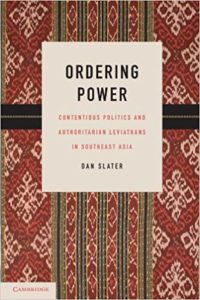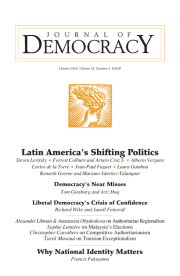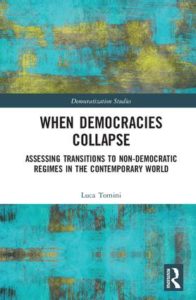 When democracy erodes, what remains? When a democracy backslides, where does it wind up? When democracy dies, what is born? asks Dan Slater, a Professor of Political Science and Director of the Weiser Center for Emerging Democracies at the University of Michigan.
When democracy erodes, what remains? When a democracy backslides, where does it wind up? When democracy dies, what is born? asks Dan Slater, a Professor of Political Science and Director of the Weiser Center for Emerging Democracies at the University of Michigan.
Two alternative undemocratic models of rule are readily identifiable, he writes for Foreign Affairs:
- One is electoral authoritarianism, in which rulers win power through elections, but those elections are either manipulated or the playing field between incumbents and opponents between elections is far from fair.
- The other is illiberal democracy, in which rulers freely win elections but then abuse both their authority and minority populations with the power they win. To put it most plainly, electoral authoritarians do as they please to win elections. Illiberal democrats do as they please after winning them. While elected leaders and governments often combine both features as democracy erodes, it’s perfectly possible to have one without the other.
 The differences between these two undemocratic beasts are legion, adds Slater, the author of Ordering Power: Contentious Politics and Authoritarian Leviathans in Southeast Asia:
The differences between these two undemocratic beasts are legion, adds Slater, the author of Ordering Power: Contentious Politics and Authoritarian Leviathans in Southeast Asia:
Electoral authoritarianism is typically the collective enterprise of a ruling party. Illiberal democracy—a term originally coined by Fareed Zakaria and recently embraced by Hungarian prime minister Viktor Orban—is more often the individual project of a power-hungry elected leader. Electoral authoritarians use subterfuge to undermine partisan opponents. Illiberal democrats openly assault minority populations and brazenly attack core democratic institutions that would constrain the elected chief executive. Electoral authoritarians will not accept defeat. Illiberal democrats will not accept restraints. Electoral authoritarians cheat so their power will not be lost. Illiberal democrats break norms and bend the rules so their power will not be limited. RTWT
 Competitive authoritarian (CA) regimes have shown themselves to be remarkably unstable, argues Christopher Carothers, a Ph.D. candidate and Ashford Fellow in the Department of Government at Harvard University. Over the medium-to-long term, CA regimes often see their stability erode precisely because they feature relative political openness and competition. There are at least four noteworthy mechanisms by which CA’s relative openness can lead to its breakdown, he writes in the NED’s Journal of Democracy.
Competitive authoritarian (CA) regimes have shown themselves to be remarkably unstable, argues Christopher Carothers, a Ph.D. candidate and Ashford Fellow in the Department of Government at Harvard University. Over the medium-to-long term, CA regimes often see their stability erode precisely because they feature relative political openness and competition. There are at least four noteworthy mechanisms by which CA’s relative openness can lead to its breakdown, he writes in the NED’s Journal of Democracy.
- First, CA provides opposition forces with legal, if difficult, options for building up public support and challenging the regime; an uneven playing field is better than none at all. As Staffan Lindberg has contended, even elections held in semiauthoritarian contexts can end up aiding democratization….
- Second, a CA regime’s manipulation of elections may succeed, but nevertheless incite public anger and trigger protests that grow into a regime-toppling mass movement. In fact, it may be the case that organizing a vote and then canceling it or blatantly cheating tends to provoke more public anger than going without elections altogether….
- Third, even if election rigging succeeds and there is no regime-threatening popular protest, quasi-competitive elections may undermine CA by a different route: Electoral gains by the opposition could trigger an autocratic backlash and a turn to full authoritarianism….
- Finally, and most speculatively, quasi-democratic institutions may put CA regimes at a disadvantage in terms of ideological legitimacy. Because CA regimes claim to be democracies, they usually deprive themselves of the alternative bases of ideological legitimacy on which many of the most durable authoritarian regimes rely. RTWT
 While the process of democratization is an established field of study, the reverse phenomenon of de-democratization garners less attention even in the face of democratic regression or breakdown, notes Luca Tomini, author of When Democracies Collapse: Assessing Transitions to Non-Democratic Regimes in the Contemporary World. De-democratization comprises two distinct processes, he suggests:
While the process of democratization is an established field of study, the reverse phenomenon of de-democratization garners less attention even in the face of democratic regression or breakdown, notes Luca Tomini, author of When Democracies Collapse: Assessing Transitions to Non-Democratic Regimes in the Contemporary World. De-democratization comprises two distinct processes, he suggests:
- Democratic regression refers to the deteriorating quality of democratic institutions within established democracies. Regressing states do not lose their democratic status, but face serious challenges with guaranteeing political rights, and/or civil liberties and participation.
- Democratic breakdown is more far-reaching and entails the loss of democratic status altogether, and a transition from democracy to a hybrid or autocratic system, usually prompted by election fraud or coups d’état. But breakdowns of Third Wave democracies tend to be more incremental, through enhancement of executive prerogatives or compromising the separation of powers, by undermining or deligitimizing the judiciary.







